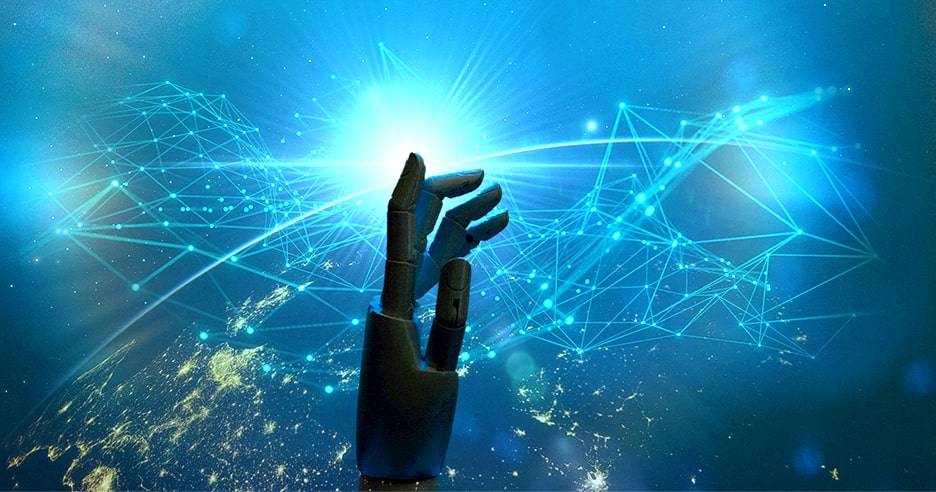The AI boom brought us a variety of smarter, faster tools that reshaped how we work, streamlining tasks, optimizing workflows and boosting productivity through our ability to prompt with traditional AI. However, that was just the tip of the iceberg of where AI is heading. Today, we’re entering a far more dynamic chapter where AI doesn’t just support your tasks but collaborates as a fully functional teammate.
Autonomous AI agents are moving out of the realm of science fiction and into the office, on the way to completely transform the way modern businesses operate. At the center of this evolution is agentic AI.
Albert Santalo, founder of Archie Labs and an FIU Executive MBA program graduate, has been a huge voice on the future of business with agentic AI, stating, “Agentic AI may be the biggest opportunity we've ever encountered in the history of business.” That might sound bold, but the evidence is hard to ignore. From writing software and managing complex logistics to elevating customer service, this tech is enabling growth at a scale that was nearly unimaginable a decade ago.
What sets it apart from familiar AI tools like ChatGPT? It’s the move from reactive assistance to autonomous proactive execution. These systems don’t just wait for instructions, they learn, plan and carry out entire operations on their own. We are stepping into a new reality of business and as Santalo puts it, it’s about unlocking new heights of efficiency and profitability, and it’s happening faster than many realize. So without further ado, let’s explore this new reality and what it holds for the future of business with agentic AI.
“Agentic AI may be the biggest opportunity we've ever encountered in the history of business.”
Agentic AI - Meet Your Autonomous Teammates
Agentic AI refers to intelligent systems that can make decisions and carry out tasks with little to no human involvement. They’re designed to operate in complex, changing environments, adjusting strategies, reacting to new information and learning as they go.
Powered by large language models and advanced algorithms, these agents can navigate digital environments and collaborate with other agents fluidly. Santalo sees this as a revolution in how businesses scale: think of replacing static workflows with systems that can self-optimize and coordinate across departments.
What sets agentic AI apart from older automation, like robotic process automation (RPA), is flexibility. RPA handles repetitive tasks. Agentic AI takes on multifaceted, evolving challenges, managing workflows, making judgment calls and improving over time.
Picture a customer service agent that adapts responses based on mood and tone, or a logistics system that fine-tunes supply routes and negotiates deals without human input. That’s where we’re headed.
Business Unbound: What Agentic AI Can Do
Agentic AI will and has become a major team player in industries by taking on complex work that once needed full human oversight. Here’s where it’s making waves:
Tech Giants
The major tech companies Google, Microsoft, Amazon, IBM and NVIDIA all have extensive investments into agentic AI, allowing them to achieve better efficiency and enhanced user experiences. Google has employed Gemini 2.0 along with Project Astra to create tools that automate work processes while improving search functionality. Microsoft has Copilot Studio and Copilot Vision to deliver seamless interactions between applications through embedded technology. Amazon has improved shopping experiences and automated workflow processes using its Nova Act and Bedrock Agents. IBM utilizes agentic AI for workflow animation and much more with watsonx Orchestrate while NVIDIA develops multi-agent systems that transform manufacturing and enterprise productivity operations.
Software Development
The current software development environment features new AI agents which create rapid product development workflows. Programmers can produce and optimize code through GitHub Copilot at unprecedented speeds and with increased precision. Lesser known platforms like Cognition AI alongside other newcomers are working to develop advanced processes which function as dedicated AI software engineers that can handle complete project development from start to finish.
Customer Service
The customer service industry has seen a shift in its customer support functions from in-person customer care to AI chat bots for more efficient service delivery. Erica at Bank of America has already managed interactions reaching 1.5 billion as evidence shows intelligent systems can provide personalized support at large scales. Companies such as Lyft and Shopify leverage Zendesk and Intercom platforms to establish AI agents which independently manage support ticket processes according to urgency and complexity levels, delivering improved efficiency and faster response times.
Logistics & Supply Chain Management
Real-time decision-making operations receive optimization through AI agents within logistics systems. Amazon implements these systems to maximize delivery operations while Maersk applies AI systems to detect and prevent global shipping interruptions. Flexport has implemented agentic AI to handle complete freight operations through data-driven supply chain management that achieves increased agility.
Marketing & Sales
Agentic systems operate autonomously to study consumer data while detecting behavioral patterns, which enables them to modify campaigns and pricing approaches in real time. Unilever and Coca-Cola are among major brands implementing these technologies to develop their market strategies through continuous refinement. Through Adobe Sensei companies including Nike and Sony achieve deep personalization and exact audience targeting while using minimal human intervention.
Healthcare
The healthcare industry is utilizing agentic AI to accelerate clinical decision-making processes with unparalleled accuracy. Medical professionals use Aidoc and Tempus platforms which examine imaging data to detect abnormalities and generate personalized treatment plans. These systems have started their adoption in hospitals together with diagnostic centers to improve patient care along with better outcomes. IBM’s Watson Health system delivered clinical decision support services to Memorial Sloan Kettering and other leading institutions during its operational period.
Finance
Financial services are using AI agents to automate their critical operations which include fraud detection, market forecasting and risk modeling. Through its COiN platform JPMorgan Chase runs automated legal document inspections to detect fraud patterns on a massive scale. Goldman Sachs and Morgan Stanley use AI systems to conduct real-time trading analysis and predictive modeling which cuts down their requirement for extensive manual analyst teams.
E-commerce
The e-commerce sector has seen significant improvements through agentic AI technology which enhances supply chain automation and personalized shopping experiences. Walmart has implemented AI technology to predict market needs and handle inventory control which boosts operational performance alongside enhanced customer satisfaction. Intelligent agents within Shopify enable dynamic pricing as well as product recommendations together with automated merchant support tools. Ebay leverages agentic AI to prevent fraud while enhancing search algorithms and improving interactions between buyers and sellers. All major platforms nowadays are leveraging these agents to increase agility and improve insight while delivering better responsiveness to market conditions.
These businesses are already acting on this new technology, implementing it, testing it and seeing the benefits, scaling operations while minimizing their headcount.
The Ethical and Operational Challenges
As with any powerful technology, agentic AI brings its share of concerns.
Who’s Responsible?
With machines making decisions on their own, assigning blame when something goes wrong gets tricky. Clear accountability and oversight of these systems is critical.
Bias in the System
These systems learn from human data, which means they can pick up human flaws. If the data’s biased, the AI might be too. Developers will need to bake fairness into the process to remove as much bias as possible.
Opaque Decisions
Many agentic systems operate like black boxes. Without any transparency, trust will erode. It’ll then become a focus to build models that can explain their choices to help combat this problem.
Privacy at Risk
The more data these systems consume, the greater the privacy concerns. Ethical data use must be at the core of deployment strategies.
Are AI Agents Taking our Jobs Away?
One of the biggest concerns about agentic AI is the potential for job displacement, not just in manual labor, but in knowledge-based roles like developers, analysts and project managers. Unlike earlier automation tools, agentic AI can perform complex, decision-driven tasks, raising fears that human roles could be diminished or replaced altogether.
Albert Santalo offers a more optimistic lens: “What’s most interesting about agentic AI is that businesses traditionally considered mom-and-pop or highly service-oriented can now achieve growth rates and profit margins once only available to pure software companies.” This suggests that while some roles may shift or disappear, new opportunities for innovation and scale will emerge, especially for those who adapt.
The key is responsible integration. Companies and policymakers must prioritize reskilling initiatives, fair labor practices and transparency around AI deployment. When used ethically, agentic AI can relieve humans of routine tasks and empower them to focus on strategy, creativity and leadership, areas where people shine.
These hurdles won’t stop AI’s spread into our day to day lives, but they are part of a worldwide fear of AI’s takeover, and they demand attention, careful management, and thoughtful design.
Our Future With AI Agents
Agentic AI won’t replace us completely, it’ll reimagine how we work. By taking on routine, complex and data-heavy tasks, these intelligent systems free people to focus on what truly requires a human touch: creativity, strategy, empathy and innovation.
Businesses that recognize this potential early and integrate agentic systems strategically will unlock new heights of innovation and efficiency. As Albert Santalo puts it: “Businesses that embrace [agentic AI] early will be best positioned to scale exponentially with unprecedented efficiency, without the need for corresponding increases in labor, resources or capital, creating existential crises for slower-moving competitors.” The message is clear: agentic AI isn’t just the next frontier, it’s the competitive edge of tomorrow and you need to start capitalizing on it right away to keep up with the change of pace.
The future of work belongs not to machines or humans alone, but to those who know how to build a partnership between the two, accelerating our ascent into a world we once thought of as purely science fiction, full of radical productivity and the transformation of our current workplace as we know it.


